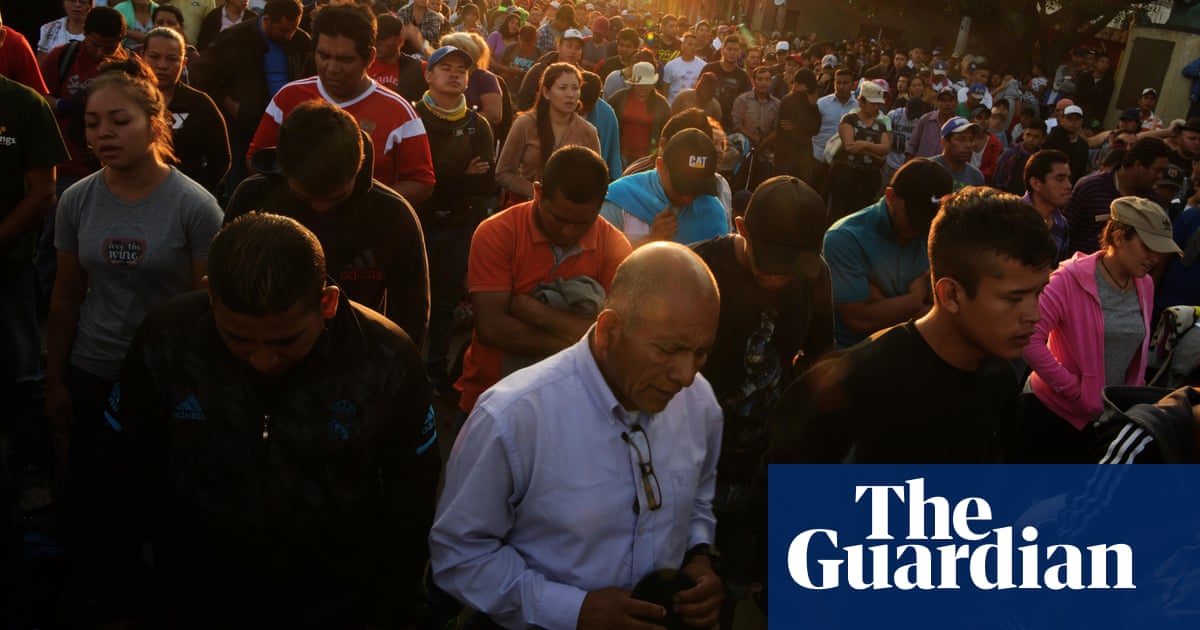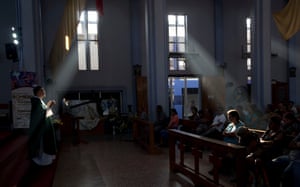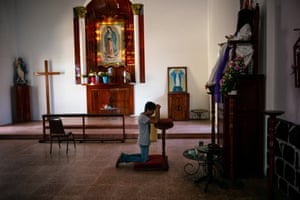As trusted individuals in a Guatemalan culture rooted in religion, pastors and priests play a role in the booming business behind immigration

Early in the morning, Antonio knelt before an altar with white candles and a small statue of the Virgin Mary and prayed for a miracle.
It was still dark when he piled into a blue van with his six-year-old son, Gaspar, and a group of other farmers and their family members hoping to reach the United States. They set out from their home town in the highlands of Guatemala and rode for hours before pulling down a narrow dirt road which ended in a clearing near the Mexican border.
The migrants bowed their head as their guide an Evangelical pastor cracked a Bible, and prayed for the groups safe passage. At the border, he whispered a last Que Dios te bendiga (May God bless you) to each before passing them to the next handler.
Guatemala is one of the biggest sources of migrants to the US, and across the highlands of this poor Central American country, churches and clergymen also play a role in the booming business of people-smuggling.
As trusted individuals in a deeply religious society, pastors and priests can offer comfort and a promise of safety to those undertaking the dangerous trek north. They also take a cut of the profits.
The church is an invisible actor in migration, said Francisco Simn, a researcher on migration and smuggling at the University of San Carlos in Guatemala. Using the image of the pastor is just one of the many ways coyotes [people smugglers] recruit clients. He has credibility and the trust of the people.
Out of 23 towns Simn recently visited in the western highlands, he found cases of pastors and priests helping people to migrate in 14 of them.
Some churchmen physically guide clients on the first leg of their journey as with the pastor who led Antonio to the border but most simply link up coyotes and potential clients. Evangelical leaders were more frequently involved in migration than Catholic priests, Simn found.
As night fell in a small highland town 70 miles from the Mexican border, a few dozen people sang pop-inspired Christian music in a simple, single-room Evangelical church.
In an office next door, drinking a Pepsi and catching up on his accounts, was Pedro, who recruits customers for a coyote.
Pastors can act as a bridge between people who want to migrate and people who can take them, he explained. They know the community.

At this church, three of the pastors brothers are well-known coyotes, according to Pedro and members of the congregation. For each customer he recruits, the pastor makes $250; he earns another $150 for praying with a group before they set out.
After the service, Manuel, 19, a member of the congregation, said that the pastor had previously helped his brother travel to the US, where he now works on construction sites in North Carolina. I know a lot of people who have traveled with this pastor. I would go, but I dont have any money, said Manuel. But pastors typically know how to get you north.
While around half of Guatemalas population is Catholic, in the last 25 years Pentacostal churches have grown increasingly important, and the country now has proportionately one of the largest Evangelical populations in Latin America.
The movement first gained traction after the countrys first Evangelical leader, Efran Ros Montt an army general and part-time lay preacher seized power in a 1982 coup. The US-backed dictator gave weekly televised sermons even as the military murdered, raped and disappeared thousands of indigenous Guatemalans in the countrys 36-year civil war.
Catholic priests were often targeted in retaliation for their perceived sympathies with leftwing Liberation Theology. Some ordinary Guatemalans turned to Protestant churches in the hope of protection.
Even after a peace deal signed in 1996, violence, corruption, racism and poverty have persisted.
The Guatemalan state remains absent from many rural areas, and Evangelicalism has mushroomed as Pentecostal churches step in to provide public services, said Kevin Lewis ONeill, a professor at the University of Toronto who studies Christianity in Guatemala.
Historically, theres no reason to trust any institutions in Guatemala other than the church. Evangelical churches in particular have been able to maintain trust by supporting these places with little state presence which live in the shadow of the war, he explains.
Pentecostal churches are omnipresent in the mostly indigenous regions where most of the countrys migrants are from.
Those churches cater not only to religious faith but also to baser motives: worshippers are told they will achieve health and wealth in exchange for regular tithes, and congregants typically pay 10% of their income to the church.

Every Evangelical church is a moment of entrepreneurialism. You only need 10 families and youre breaking even, if you take tithing seriously, said ONeill. Its a way to create a job out of nothing. It is also why there is so much competition in Guatemala and why there are so many churches.
On top of tithes, pastors and priests can also make hundreds of dollars for each migrant they recruit, and further bonuses for praying with each group. Successful migrants will sometimes also send small remittances.
In return, churchmen can recommend trustworthy coyotes who will safely help migrants through at least the first stage of their long journey north.
In a dusty, drought-plagued town in the Huehuetenango department, Victor was recently working on a new second floor at the home of his brother, an evangelical pastor. The freshly-painted house stood out from the neighbouring homes made of wood and corrugated metal, and gave testament to his good fortunes.
[My brother] works as a middleman for people who want to go north, Victor said. He knows who the smugglers are because he sent his two children to the USA.
Coyotes sometimes use Christian messaging in their advertising, said Simn. One card handed out by a smuggler features a quotation from the book of Psalms The steps of a good man are ordered by the Lord, and He delighteth in his way emblazoned over a picture of a bus. Underneath, a caption reads: If you need to travel to the United States have FAITH, trust in God and in the trip. We take: older people, minors, fathers and mothers with children.
And potential migrants sometimes turn to their pastors for advice when they are seeking a guide north.
One recent evening a young woman called Dina, logged onto Facebook and messaged an evangelical pastor she knew. I want to go to the US, she wrote.
He replied instantly: I have contacts with some coyotes because when people leave for their trip I go to pray for them. I can recommend you to one and help you with prayer.
Come by on Tuesday to discuss.
-
Names have been changed


Recent Comments